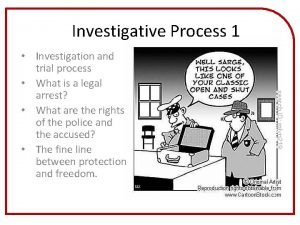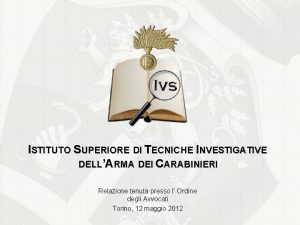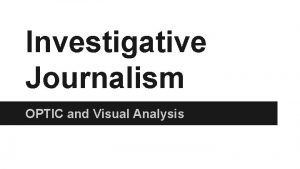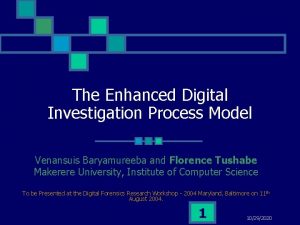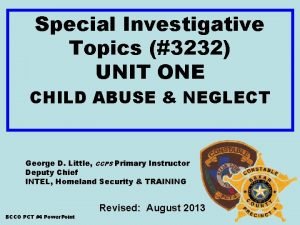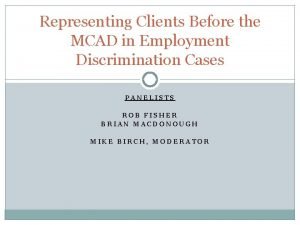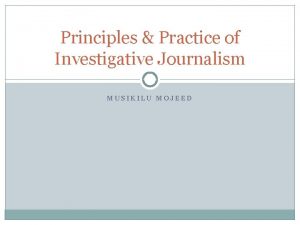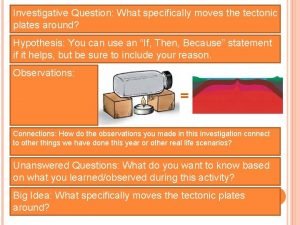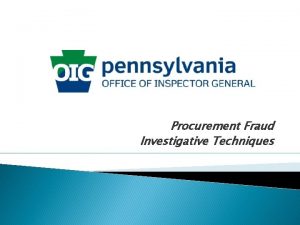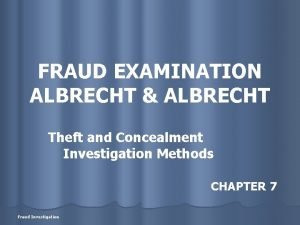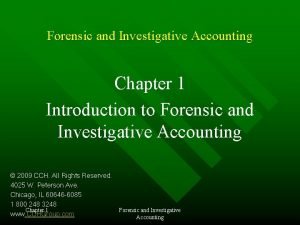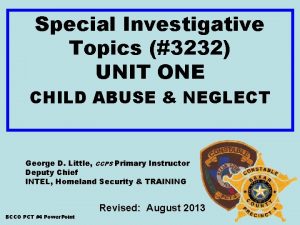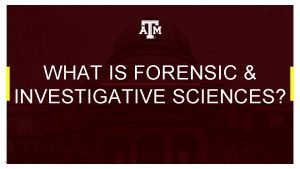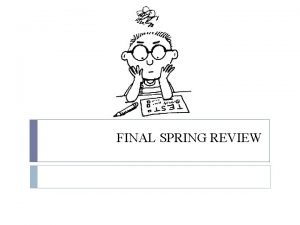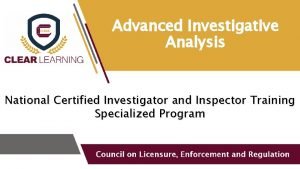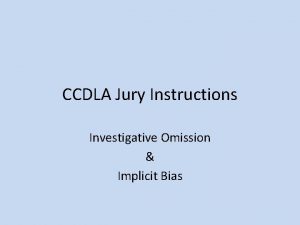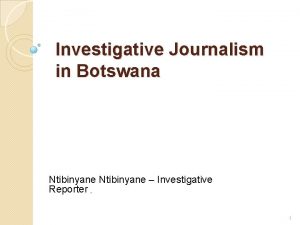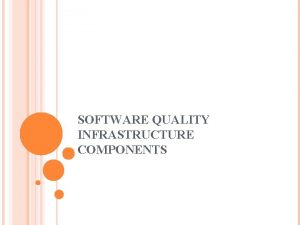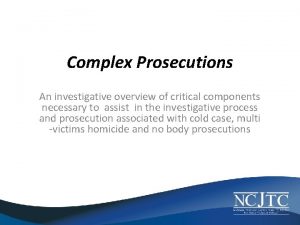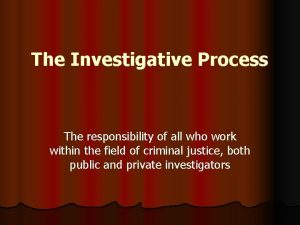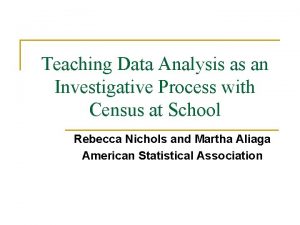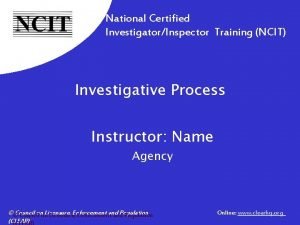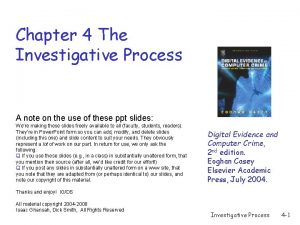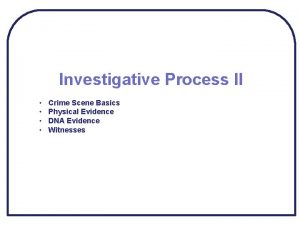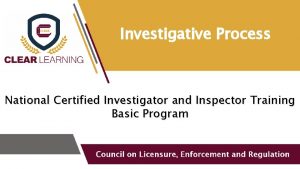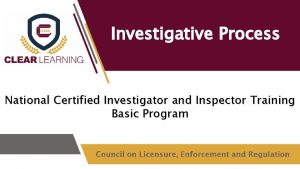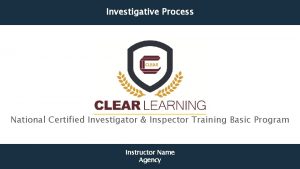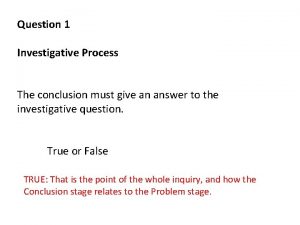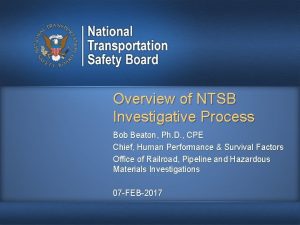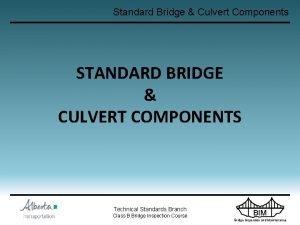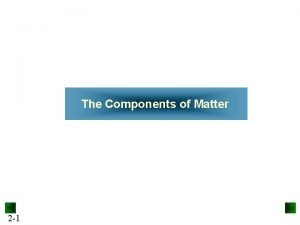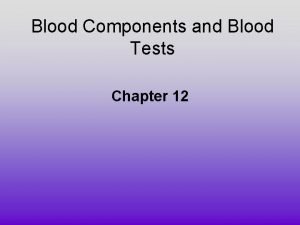Investigative Process I Components of the Investigative Process






























































- Slides: 62

Investigative Process

I. Components of the Investigative Process Intake Analysis Planning Executio n

Definitions

II. Intake of Complaints- Definitions § Complaint- An expression of pain, dissatisfaction, resentment, discontent or grief § Complaint (legal)- The presentation by the plaintiff in a civil action, setting forth the claim on which relief is sought, i. e. Administrative complaint

II. Intake of Complaints- Definitions § Allegation § Violation § Inquiry § Jurisdiction

II. Intake of Complaints- Definitions § Legally Sufficient Complaint- A complaint is legally sufficient if the facts as alleged, if shown to be true, would constitute a violation of applicable law(s) or rule(s)

Intake of Complaints

II. Intake of Complaints- Sources of Complaints § Consumer § Other professional licensees § Professional associations/societies § Other provincial organizations § Internally generated § Law enforcement agencies § Insurance companies § Media § Anonymous § Consumer service organizations § Hospitals § Lawyer Representing complainant

II. Intake of Complaints § Standard of Acceptance § Jurisdiction § Legal Sufficiency

II. Intake of Complaints – Other Issues § Complaints Information § Statutory Requirements § Written § Verbal or Oral § Method of Receipt and Review § Centralized § De-Centralized § Recording of Intake Information § Formal § Informal

Complaint Analysis

III. Complaint Analysis § Definition: The process by which raw complaint information, in the form of verbal and written statements and documents, is applied to statutory and regulatory guidelines and mandates

III. Complaint Analysis § The Intake Investigation § Peer Review § Expert Assistance § Jurisdictional Issues § Overlapping Jurisdictions § Levels of Jurisdiction

III. Complaint Analysis- Interagency Relations § Characteristics of Law Enforcement Personnel § Competitive § Cooperative § Suspicious § Persuasive § Assertive

III. Complaint Analysis- Interagency Relations § Behaviour of individuals § Result of Stimulus § Officials Play Roles § Predictable § Interfacing with other organizations § Seek bodies with similar jurisdictions § Avoid “Turf Battles” § Avoid Criticism § Positive Influences § Remember the Goal: Cooperation

Investigative Planning

IV. Investigative Planning § Role of the Investigator § Proper Review of Complaint § Powers and Authority

IV. Investigative Planning § The Investigative Plan § Format § The “ 5 W’s Test” Why What Who The “ 5 W’s Test When Where

IV. Investigative Planning § Case Development Questions: § What are the allegations? § What law or regulations may have been violated? § What evidence will be needed to support the allegations?

IV. Investigative Planning § Case Development Issues Directly Related to the Complaint § Elements § Sources of Information § Witnesses § Legal Instruments § Collect and Maintain Evidence § Experts § Problems

Sample Statutes § Failing to act as a licensee in such a manner as to safeguard the interest of the public, or otherwise engaging in improper, fraudulent, or dishonest conduct.

Sample Statutes § Failing to provide expedient, reliable and dependable services when requested by a client or a client’s guardian.

IV. Investigative Planning § Case Development Issues Indirectly Related to the Complaint § Priority Assignments § Costs § Geographic Considerations § Staff Training/Talent/Skill Levels § Board Rules and Policy

V. Selection of Investigative Method § Field/Office § Inspection § Use of Experts or Consultants § Undercover (covert) vs. Direct (overt) § Other

VI. Investigative Tools § Required Reports/Records § Physical Inspections/Inspection Warrants § Subpoena (Subpoena Duces Tecum) § Search Warrants § Requires Probable Cause § Investigative Hearings § Demand Letter § Interviews

VII. Seven Basic Sources for Obtaining Investigative Information § Primary Source: Individual Investigator § Second: Complainant § Third: Respondent § Fourth: Witnesses § Fifth: Public Records § Sixth: Private Records § Seventh: Physical/Electronic

VIII. Investigative Planning Resources § Investigative Plan § Number of Interviews § Records § Unusual Characteristics § Covert vs. Overt Investigation § Special Assistance

VIII. Investigative Planning Resources § Personnel § Materials Required § Financial Resources

Execution

IX. Execution § Flexibility § Activity vs. Results § Prosecution Requirements § Board/Departmental Policies § Statutory Mandates

Investigator Safety

X. Investigator Safety – I<Clicker Question Have you ever walked into an interview/inspection and noticed a weapon on the premises? A. Yes B. No

X. Investigator Safety – I<Clicker Question Are you permitted to bring law enforcement support along on investigations, interviews, or inspections? A. Yes B. No C. Unsure

X. Investigator Safety – I<Clicker Question Have you ever gone to a subject’s home or location selected by a subject for an interview and not told anyone where you were going? A. Yes B. No

X. Investigator Safety – I<Clicker Question Have you ever had an internal ‘bad feeling’ about an investigation/inspection/interview and done it anyway? A. Yes B. No

X. Investigator Safety § The Investigator § Potentially Confrontational or Threatening Situations § Awareness of Self § Awareness of Others § Awareness of Environment

X. Investigator Safety- Verbal De-escalation Techniques § Dealing with Human Beings § We never know how people will respond in a given situation § Behaviour is controlled by logic and reason – to a point § Being the subject of an investigation may send some people into “survival” mode


X. Investigator Safety- Verbal De-escalation Techniques § Fight or Flight § Natural instinct possessed by human beings § This reliable instinct provides “danger radar” and should not be ignored § Must know how to read and react to potentially dangerous encounters

X. Investigator Safety- Verbal De-escalation Techniques § Using Verbal De-Escalation § Use only in potentially violent situations when NO WEAPON IS INVOLVED § Reasoning with an enraged person is NOT possible § De-Escalation techniques are counter-intuitive and must be practiced before they are needed

X. Investigator Safety- Verbal De-escalation Techniques § The Investigator/Inspector is in Control of Him/Her Self § Appear Calm § Use low tone of voice § Remove jewelry or scarves § Remove religious or political symbols

X. Investigator Safety- Verbal De-escalation Techniques § The Investigator/Inspector is in Control of Him/Her Self § Do not be defensive § Be aware of options for back-up § Be respectful while firmly setting limits § Treat the subject with respect

X. Investigator Safety- Verbal De-escalation Techniques § The Physical Stance § Never turn your back § Stay on the same eye level § Allow extra space between yourself and the subject § Do not maintain constant eye contact

X. Investigator Safety- Verbal De-escalation Techniques § The Physical Stance § Do not point or make aggressive gestures § Do not touch the person- for any reason § Keep hands out of pockets

X. Investigator Safety- Verbal De-escalation Techniques § The De-escalation Discussion § Only goals is to reduce the level of arousal § Do not raise your voice § Respectfully answer informational questions, even if rudely asked § Do not answer abusive questions

X. Investigator Safety- Verbal De-escalation Techniques § The De-escalation Discussion § Explain limits and give choices where possible § Do not solicit or analyze feelings § Do not argue or try to convince § Encourage the subject to think cognitively

X. Investigator Safety- Verbal De-escalation Techniques § The De-escalation Discussion § Suggest alternative behaviours, where appropriate § Give consequences of inappropriate behaviour without threats § Represent controls as institutional § Trust your instincts

Investigative Process Review Questions

Review Question 1 Because of specialization in practice areas, investigations often require: A. The use of experts/consultants. B. The inclusion of the respondent’s professional opinion. C. Public input.

Review Question 2 A standardized document on which elements of the complaint are listed and tracked is known as: A. B. C. D. Complaint documentation. An investigative collection. A centralized collection process. Organizational process.

Review Question 3 The correct order of the main components of the investigative process is: A. B. C. D. Intake, Planning, Execution, Analysis. Intake, Analysis, Planning, Execution, Intake, Analysis, Intake, Planning, Execution.

Review Question 4 Which of the following is NOT one of the seven basic sources of investigative information? A. B. C. D. The The Investigator Respondent’s Spouse Respondent Complainant

Review Question 5 The A. B. C. D. is the primary source of investigative information. Investigator Respondent Complainant Professional body

Investigative Process Summary (1 of 3) § A complaint is an expression of pain, grief or dissatisfaction § Most organizations accept complaints in either written or oral formats § The centralized collection process includes a standard document on which all elements of a complaint are listed and tracked

Investigative Process Summary (2 of 3) § Financial considerations, personnel requirements and equipment needs should all be considered when developing an investigative plan § Identify the elements of the law or regulation in order to develop sufficient information to prove a case

Investigative Process Summary (3 of 3) § Use experts to gain knowledge in specified practice areas § The complainant provides the information that forms the foundation of the complaint § The primary source of investigative information is the investigator

NCIT Basic Evaluations Investigative Process

In general, this instructor: A. B. C. D. E. Unacceptable Needs to Improve Is Good Is Very Good Excellent

The style of delivery: A. B. C. D. E. Unacceptable Needs to Improve Is Good Is Very Good Excellent

The content: A. B. C. D. E. Unacceptable Needs to Improve Is Good Is Very Good Excellent

The amount of material covered: A. B. C. D. E. Unacceptable Needs to Improve Is Good Is Very Good Excellent

The usefulness of this session : A. B. C. D. E. Unacceptable Needs to Improve Is Good Is Very Good Excellent
 Investigative process
Investigative process Tecniche investigative carabinieri
Tecniche investigative carabinieri Optic picture analysis
Optic picture analysis Challenges of investigative reporting in kenya
Challenges of investigative reporting in kenya Abstract digital forensics model
Abstract digital forensics model Special investigative topics 3232 quizlet
Special investigative topics 3232 quizlet Mcad rebuttal to position statement
Mcad rebuttal to position statement Principles of investigative journalism
Principles of investigative journalism Questions about tectonic plates
Questions about tectonic plates Investigative psychology definition
Investigative psychology definition Investigative phenomenon
Investigative phenomenon Tes holland
Tes holland Special investigative techniques
Special investigative techniques Concealment investigative methods
Concealment investigative methods Introduction to forensic accounting
Introduction to forensic accounting Artistic social enterprising
Artistic social enterprising Special investigative topics 3232
Special investigative topics 3232 Investigative sciences
Investigative sciences Bottleneck effect
Bottleneck effect Balkan investigative reporting network
Balkan investigative reporting network Balkan investigative reporting network
Balkan investigative reporting network Hình ảnh bộ gõ cơ thể búng tay
Hình ảnh bộ gõ cơ thể búng tay Slidetodoc
Slidetodoc Bổ thể
Bổ thể Tỉ lệ cơ thể trẻ em
Tỉ lệ cơ thể trẻ em Gấu đi như thế nào
Gấu đi như thế nào Thang điểm glasgow
Thang điểm glasgow Chúa yêu trần thế
Chúa yêu trần thế Các môn thể thao bắt đầu bằng từ đua
Các môn thể thao bắt đầu bằng từ đua Thế nào là hệ số cao nhất
Thế nào là hệ số cao nhất Các châu lục và đại dương trên thế giới
Các châu lục và đại dương trên thế giới Công thức tính độ biến thiên đông lượng
Công thức tính độ biến thiên đông lượng Trời xanh đây là của chúng ta thể thơ
Trời xanh đây là của chúng ta thể thơ Mật thư tọa độ 5x5
Mật thư tọa độ 5x5 101012 bằng
101012 bằng Phản ứng thế ankan
Phản ứng thế ankan Các châu lục và đại dương trên thế giới
Các châu lục và đại dương trên thế giới Thể thơ truyền thống
Thể thơ truyền thống Quá trình desamine hóa có thể tạo ra
Quá trình desamine hóa có thể tạo ra Một số thể thơ truyền thống
Một số thể thơ truyền thống Bàn tay mà dây bẩn
Bàn tay mà dây bẩn Vẽ hình chiếu vuông góc của vật thể sau
Vẽ hình chiếu vuông góc của vật thể sau Thế nào là sự mỏi cơ
Thế nào là sự mỏi cơ đặc điểm cơ thể của người tối cổ
đặc điểm cơ thể của người tối cổ V cc cc
V cc cc Vẽ hình chiếu đứng bằng cạnh của vật thể
Vẽ hình chiếu đứng bằng cạnh của vật thể Tia chieu sa te
Tia chieu sa te Thẻ vin
Thẻ vin đại từ thay thế
đại từ thay thế điện thế nghỉ
điện thế nghỉ Tư thế ngồi viết
Tư thế ngồi viết Diễn thế sinh thái là
Diễn thế sinh thái là Dot
Dot Các số nguyên tố
Các số nguyên tố Tư thế ngồi viết
Tư thế ngồi viết Lời thề hippocrates
Lời thề hippocrates Thiếu nhi thế giới liên hoan
Thiếu nhi thế giới liên hoan ưu thế lai là gì
ưu thế lai là gì Sự nuôi và dạy con của hươu
Sự nuôi và dạy con của hươu Khi nào hổ con có thể sống độc lập
Khi nào hổ con có thể sống độc lập Hệ hô hấp
Hệ hô hấp Từ ngữ thể hiện lòng nhân hậu
Từ ngữ thể hiện lòng nhân hậu Thế nào là mạng điện lắp đặt kiểu nổi
Thế nào là mạng điện lắp đặt kiểu nổi
